
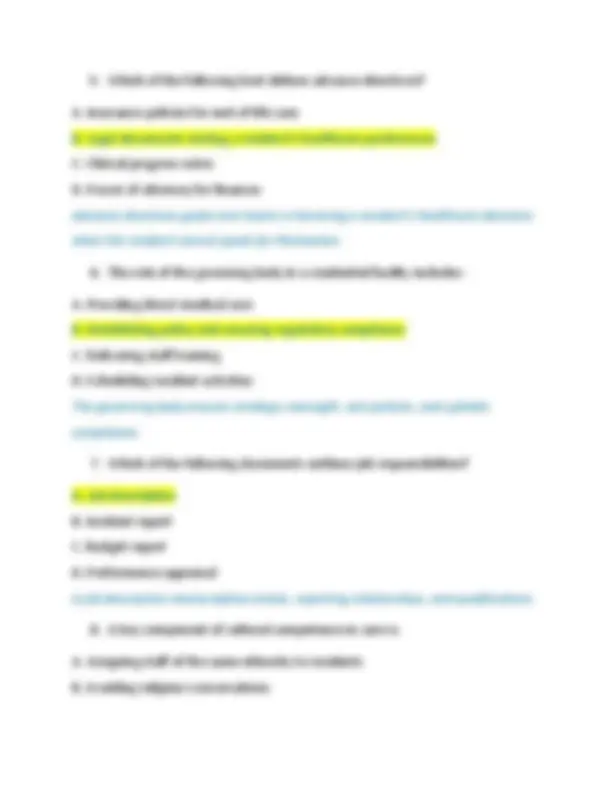
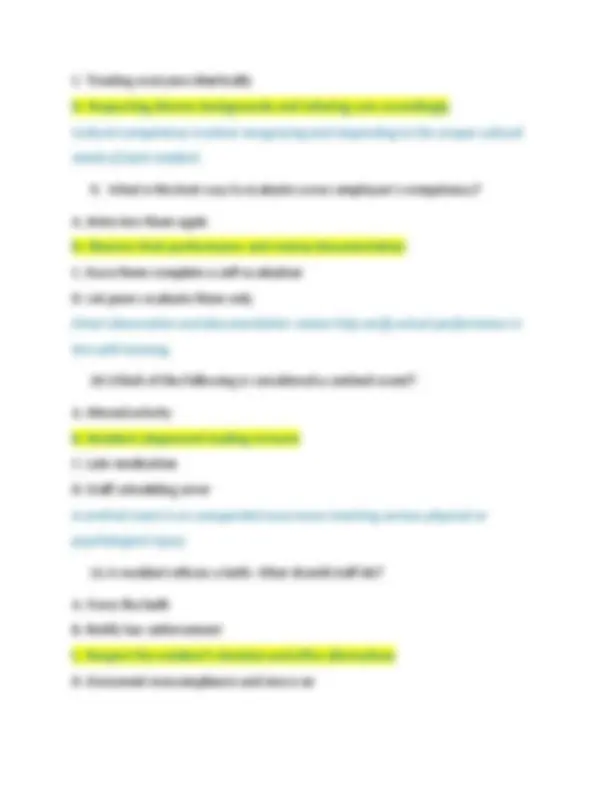
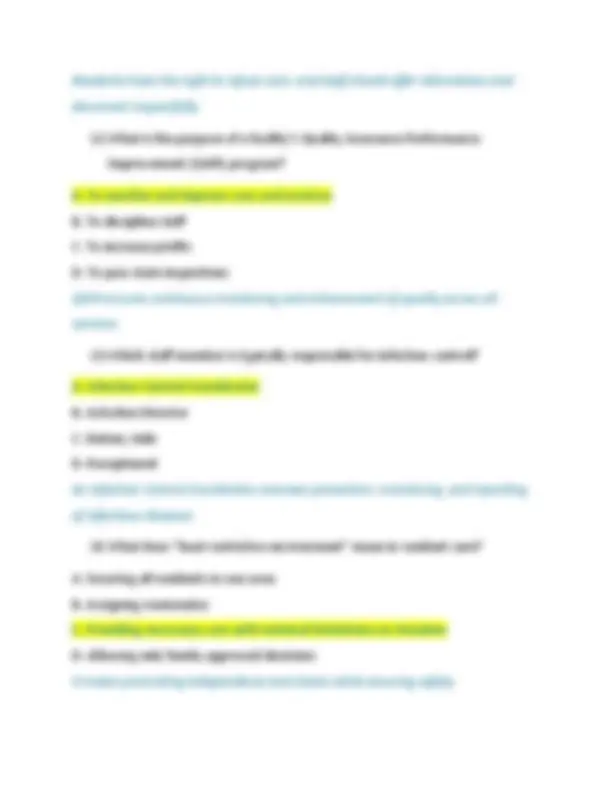
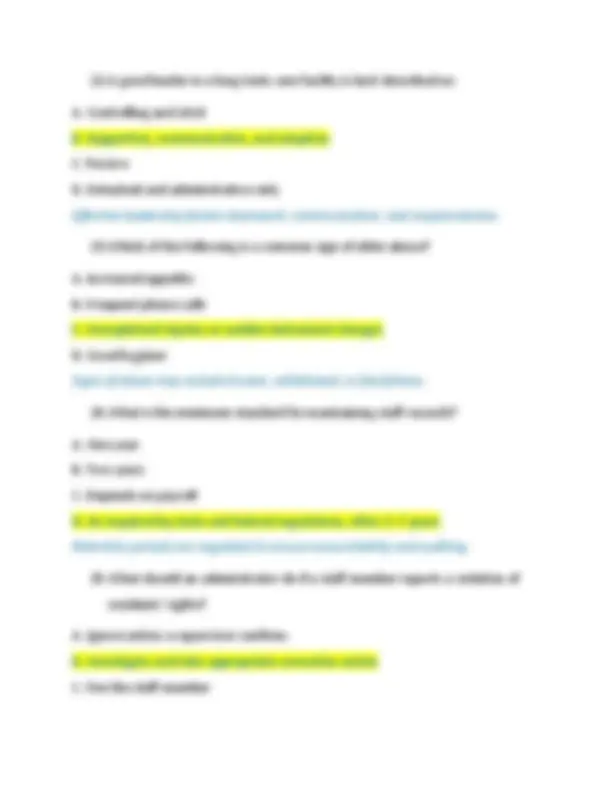
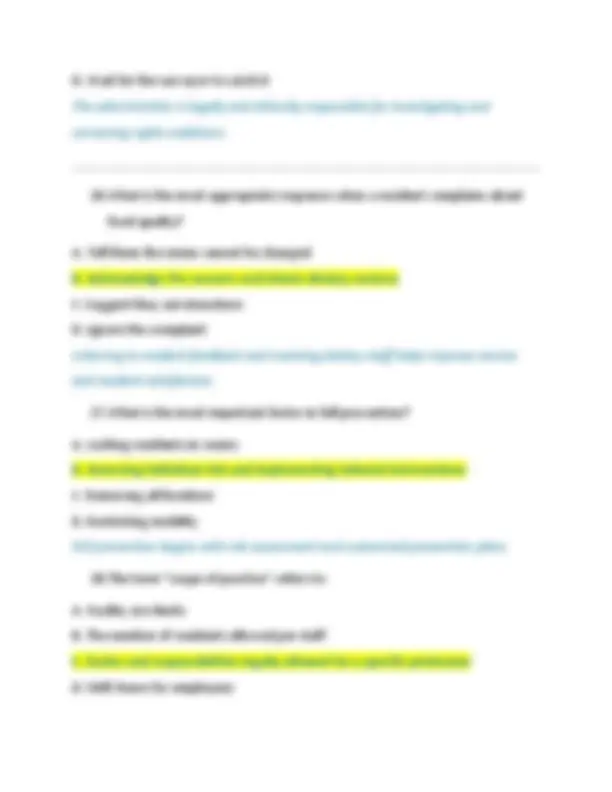
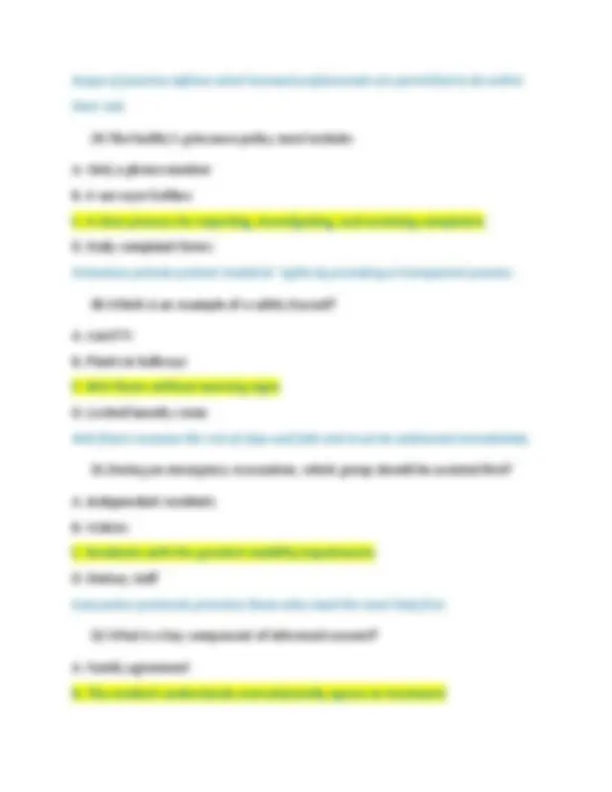
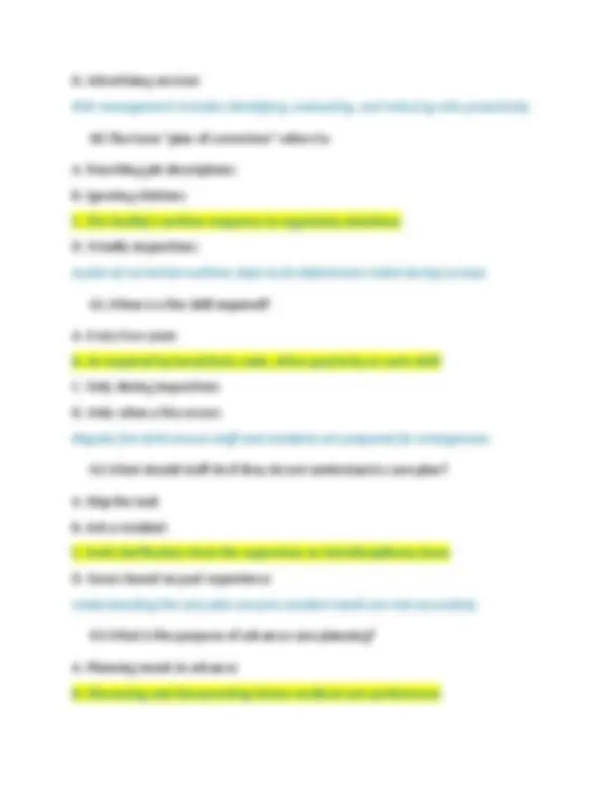
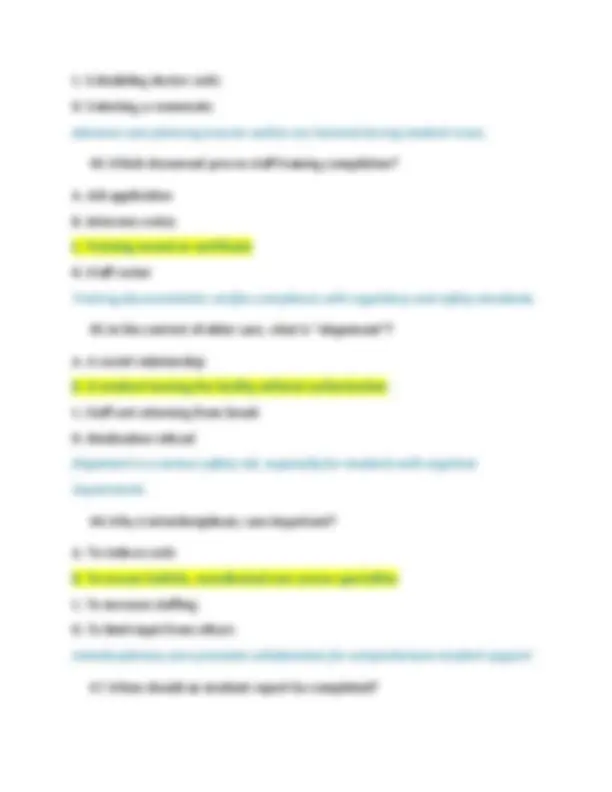
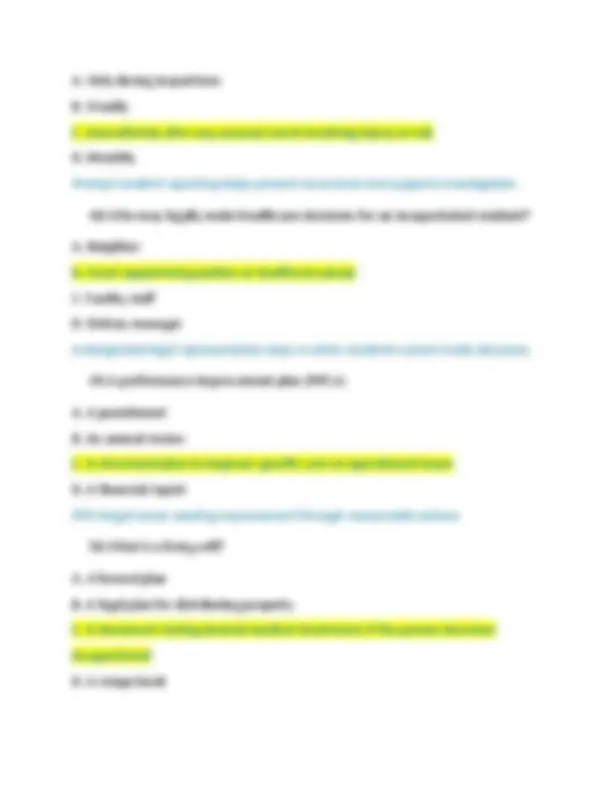
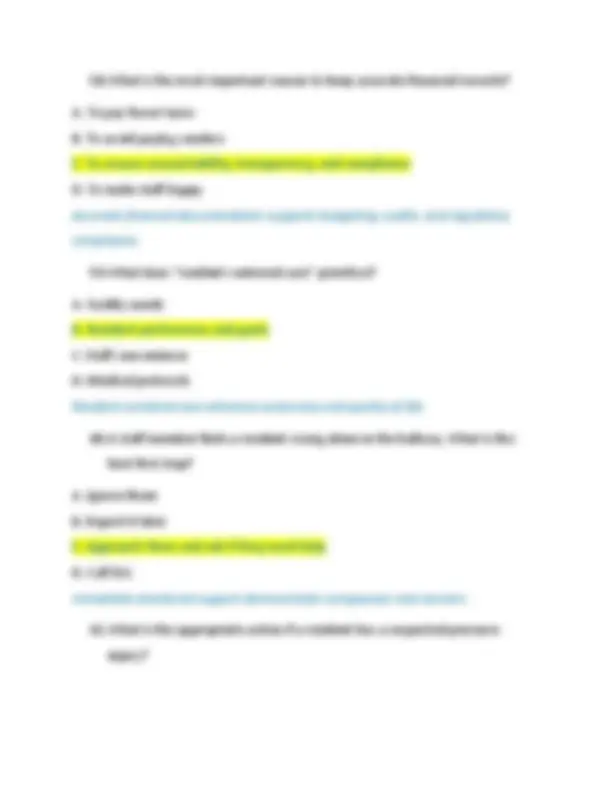
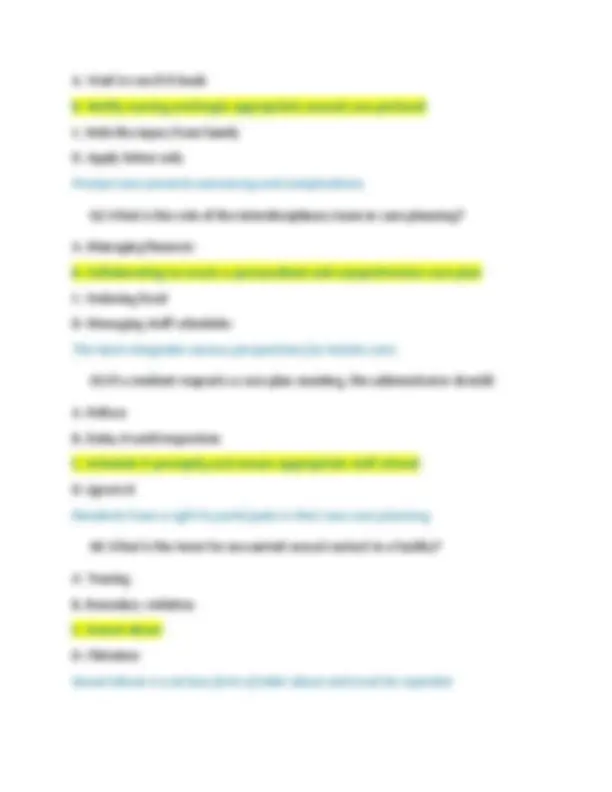
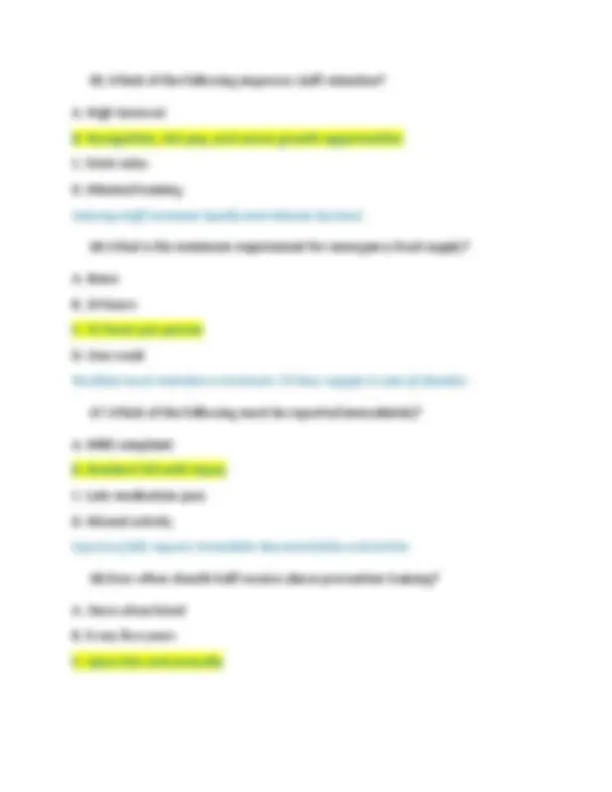
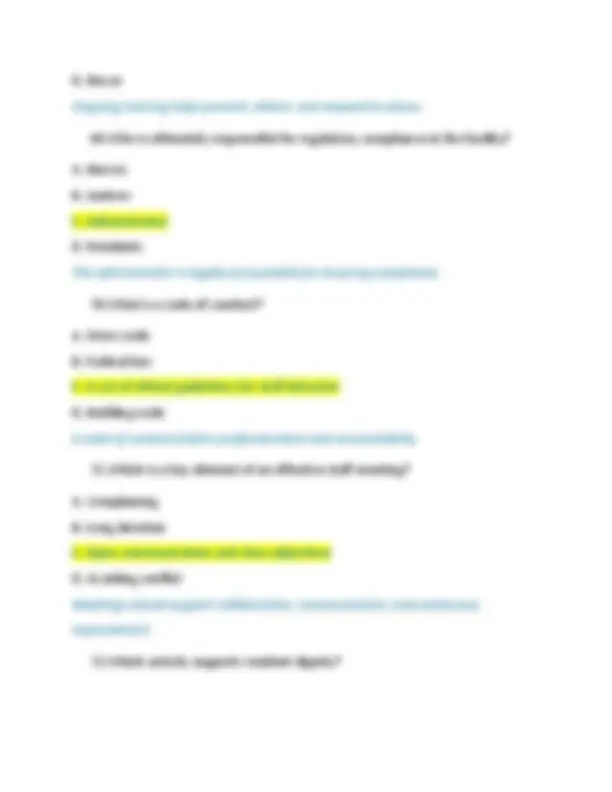
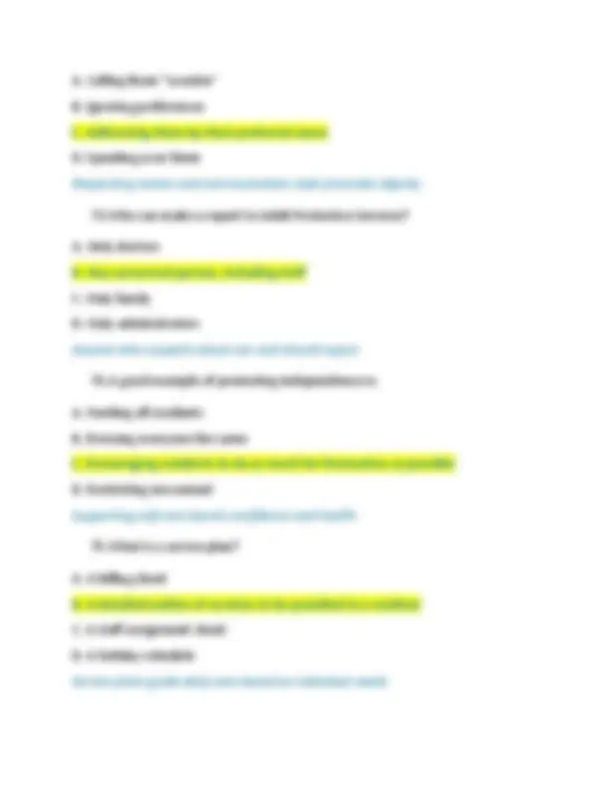
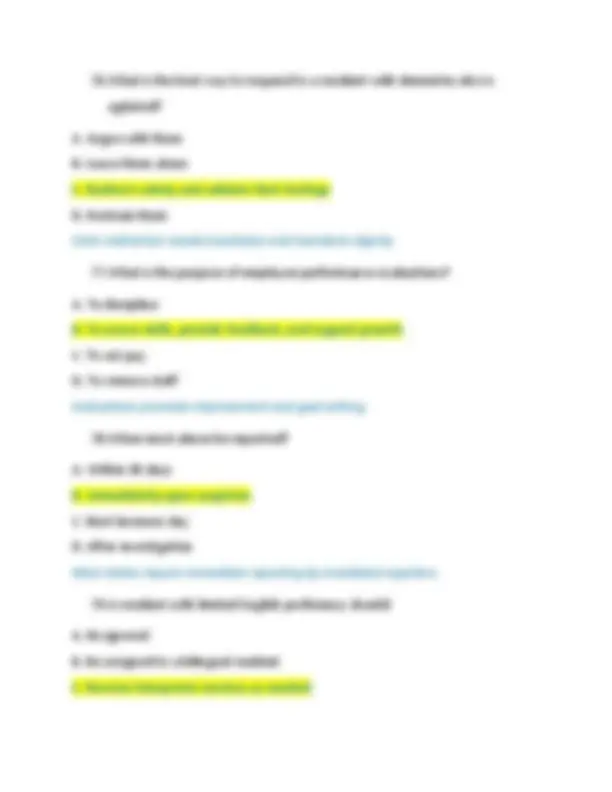
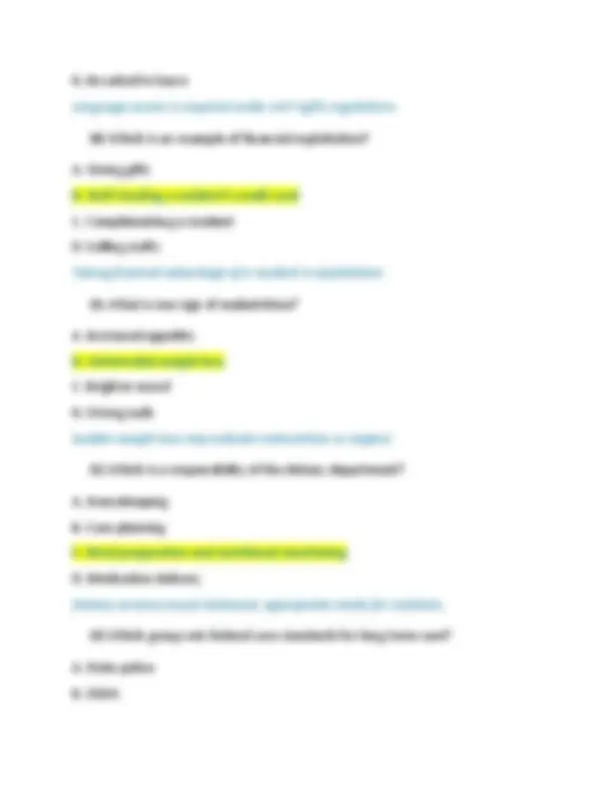
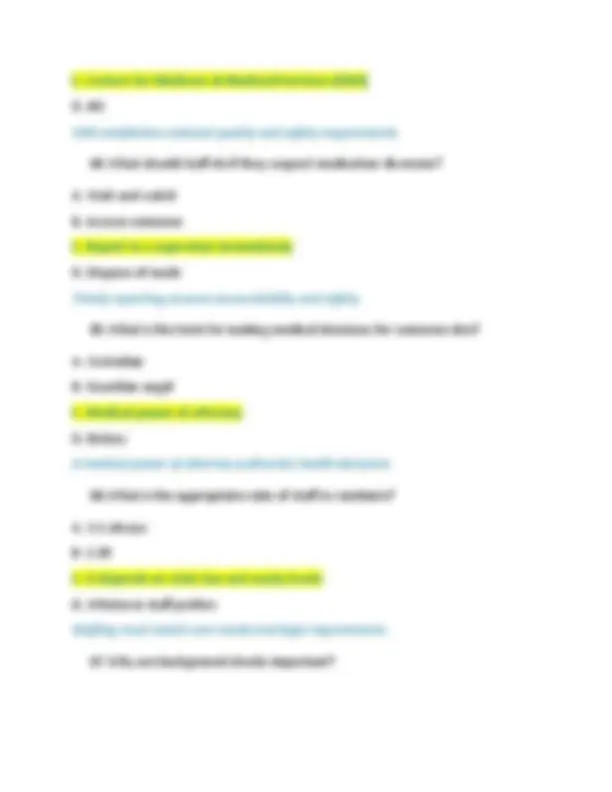
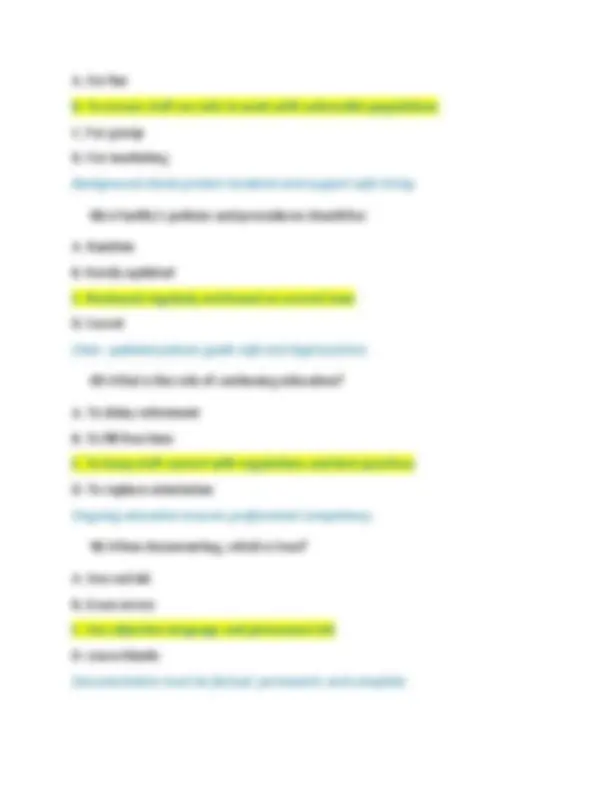
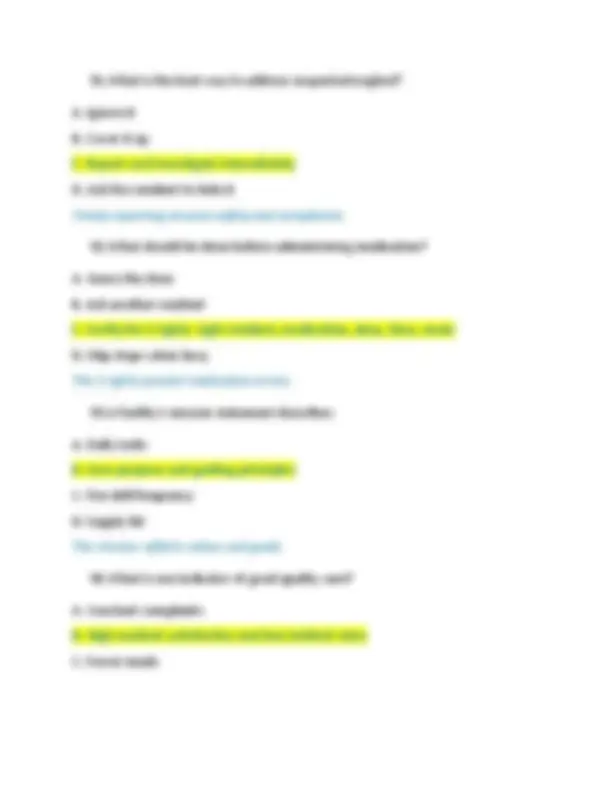
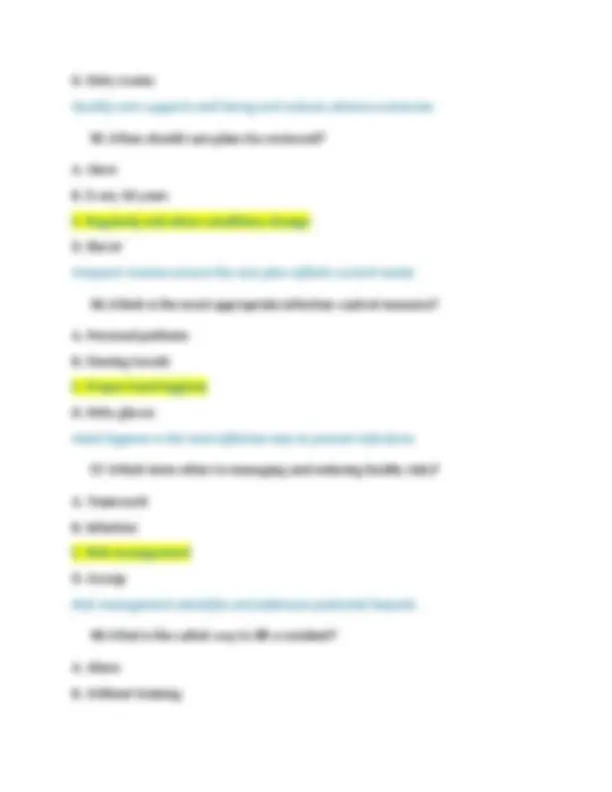
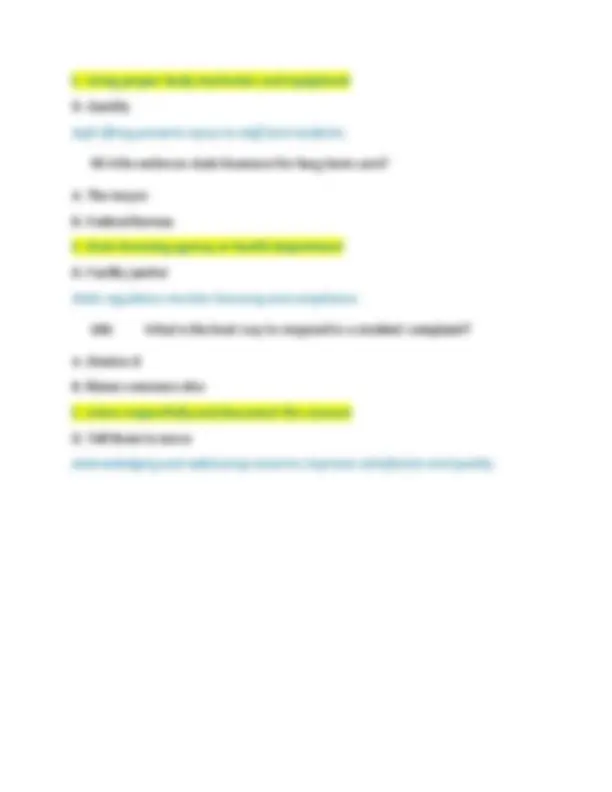


Study with the several resources on Docsity

Earn points by helping other students or get them with a premium plan


Prepare for your exams
Study with the several resources on Docsity

Earn points to download
Earn points by helping other students or get them with a premium plan
Community
Ask the community for help and clear up your study doubts
Discover the best universities in your country according to Docsity users
Free resources
Download our free guides on studying techniques, anxiety management strategies, and thesis advice from Docsity tutors
General Core of Knowledge Exam and Line of Service (LOS) Exam, which is commonly required for Residential Care/Assisted Living Administrators and similar state licensing roles
Typology: Exams
1 / 29

This page cannot be seen from the preview
Don't miss anything!






















C. Treating everyone identically D. Respecting diverse backgrounds and tailoring care accordingly Cultural competence involves recognizing and responding to the unique cultural needs of each resident.
Residents have the right to refuse care, and staff should offer alternatives and document respectfully. 12.What is the purpose of a facility’s Quality Assurance Performance Improvement (QAPI) program? A. To monitor and improve care and services B. To discipline staff C. To increase profits D. To pass state inspections QAPI ensures continuous monitoring and enhancement of quality across all services. 13.Which staff member is typically responsible for infection control? A. Infection Control Coordinator B. Activities Director C. Dietary Aide D. Receptionist An Infection Control Coordinator oversees prevention, monitoring, and reporting of infectious diseases. 14.What does “least restrictive environment” mean in resident care? A. Securing all residents in one area B. Assigning roommates C. Providing necessary care with minimal limitations on freedom D. Allowing only family-approved decisions It means promoting independence and choice while ensuring safety.
A. Scheduled bathroom times B. Pre-approved meal lists only C. Choosing when and what to eat D. Assigning roommates without discussion Autonomy means allowing residents to make decisions about their daily life. 19.The Americans with Disabilities Act (ADA) ensures: A. Access to federal benefits B. Equal access and accommodations for individuals with disabilities C. Free housing D. Universal health insurance The ADA prohibits discrimination and promotes accessibility. 20.When documenting in a medical record, staff should: A. Use pencil for easy corrections B. Use black or blue ink and avoid corrections with white-out C. Erase mistakes completely D. Use abbreviations freely Documentation must be permanent, legible, and legally sound. 21.What is the primary purpose of staff orientation? A. To fill out paperwork B. To tour the facility C. To train new hires on policies, procedures, and expectations D. To introduce them to residents Orientation ensures that new employees are equipped to perform their roles safely and effectively.
22.A good leader in a long-term care facility is best described as: A. Controlling and strict B. Supportive, communicative, and adaptive C. Passive D. Detached and administrative only Effective leadership fosters teamwork, communication, and responsiveness. 23.Which of the following is a common sign of elder abuse? A. Increased appetite B. Frequent phone calls C. Unexplained injuries or sudden behavioral changes D. Good hygiene Signs of abuse may include bruises, withdrawal, or fearfulness. 24.What is the minimum standard for maintaining staff records? A. One year B. Two years C. Depends on payroll D. As required by state and federal regulations, often 3–7 years Retention periods are regulated to ensure accountability and auditing. 25.What should an administrator do if a staff member reports a violation of residents’ rights? A. Ignore unless a supervisor confirms B. Investigate and take appropriate corrective action C. Fire the staff member
Scope of practice defines what licensed professionals are permitted to do within their role. 29.The facility’s grievance policy must include: A. Only a phone number B. A surveyor hotline C. A clear process for reporting, investigating, and resolving complaints D. Daily complaint forms Grievance policies protect residents’ rights by providing a transparent process. 30.Which is an example of a safety hazard? A. Loud TV B. Plants in hallways C. Wet floors without warning signs D. Locked laundry room Wet floors increase the risk of slips and falls and must be addressed immediately. 31.During an emergency evacuation, which group should be assisted first? A. Independent residents B. Visitors C. Residents with the greatest mobility impairments D. Dietary staff Evacuation protocols prioritize those who need the most help first. 32.What is a key component of informed consent? A. Family agreement B. The resident understands and voluntarily agrees to treatment
C. Resident’s age D. Administrator’s approval Informed consent requires understanding and voluntary acceptance of treatment options. 33.What does OSHA primarily regulate in long-term care facilities? A. Clinical performance B. Employee safety and workplace hazards C. Resident dietary plans D. Insurance coverage OSHA (Occupational Safety and Health Administration) focuses on worker health and safety. 34.Which of the following is an example of non-verbal communication? A. Calling out B. Facial expressions and posture C. Yelling D. Reading aloud Non-verbal cues like facial expressions play a significant role in communication. 35.Who is responsible for maintaining medical records confidentiality? A. Just nurses B. All staff handling protected health information C. Only administrators D. Residents All staff with access to records must protect confidentiality under HIPAA.
D. Advertising services Risk management includes identifying, evaluating, and reducing risks proactively. 40.The term "plan of correction" refers to: A. Rewriting job descriptions B. Ignoring citations C. The facility’s written response to regulatory violations D. Weekly inspections A plan of correction outlines steps to fix deficiencies noted during surveys. 41.When is a fire drill required? A. Every two years B. As required by local/state code, often quarterly on each shift C. Only during inspections D. Only when a fire occurs Regular fire drills ensure staff and residents are prepared for emergencies. 42.What should staff do if they do not understand a care plan? A. Skip the task B. Ask a resident C. Seek clarification from the supervisor or interdisciplinary team D. Guess based on past experience Understanding the care plan ensures resident needs are met accurately. 43.What is the purpose of advance care planning? A. Planning meals in advance B. Discussing and documenting future medical care preferences
C. Scheduling doctor visits D. Selecting a roommate Advance care planning ensures wishes are honored during medical crises. 44.Which document proves staff training completion? A. Job application B. Interview notes C. Training record or certificate D. Staff roster Training documentation verifies compliance with regulatory and safety standards. 45.In the context of elder care, what is “elopement”? A. A secret relationship B. A resident leaving the facility without authorization C. Staff not returning from break D. Medication refusal Elopement is a serious safety risk, especially for residents with cognitive impairments. 46.Why is interdisciplinary care important? A. To reduce costs B. To ensure holistic, coordinated care across specialties C. To increase staffing D. To limit input from others Interdisciplinary care promotes collaboration for comprehensive resident support. 47.When should an incident report be completed?
A living will directs future medical care when the individual cannot express preferences. 51.What is the primary purpose of the resident assessment? A. To determine the cost of care B. To identify the resident’s needs, preferences, and capabilities C. To compare residents D. To assign a roommate Assessments guide care planning by identifying physical, emotional, and social needs. 52.What is the best way to ensure consistent infection control practices? A. Use signs only B. Assign one staff member to clean C. Provide training and enforce infection control policies D. Rely on common sense Infection control requires policies, procedures, and consistent staff education. 53.A resident is pacing and appears agitated. What should staff do first? A. Restrain the resident B. Approach calmly and attempt to de-escalate C. Call family D. Send the resident to their room De-escalation preserves safety and dignity without unnecessary confrontation. 54.Which is a key benefit of team-based care?
A. Quicker billing B. Improved communication and better resident outcomes C. More paperwork D. Decreased staff responsibilities Team-based care supports collaboration and comprehensive service delivery. 55.Who is allowed to access a resident’s medical records? A. All facility staff B. Any family member C. Only those authorized by the resident or law D. Insurance companies without consent HIPAA restricts access to ensure confidentiality and security. 56.What is the most appropriate method of managing aggressive resident behavior? A. Immediate discharge B. Ignoring them C. Use of de-escalation techniques and behavior support plans D. Restricting meals Understanding triggers and applying trained techniques reduce conflict. 57.When do residents have the right to refuse treatment? A. Only on weekends B. Only with family approval C. At any time, as long as they are competent D. Never Competent residents maintain the legal right to accept or refuse care.
A. Wait to see if it heals B. Notify nursing and begin appropriate wound care protocol C. Hide the injury from family D. Apply lotion only Prompt care prevents worsening and complications. 62.What is the role of the interdisciplinary team in care planning? A. Managing finances B. Collaborating to create a personalized and comprehensive care plan C. Ordering food D. Managing staff schedules The team integrates various perspectives for holistic care. 63.If a resident requests a care plan meeting, the administrator should: A. Refuse B. Delay it until inspection C. Schedule it promptly and ensure appropriate staff attend D. Ignore it Residents have a right to participate in their own care planning. 64.What is the term for unwanted sexual contact in a facility? A. Teasing B. Boundary violation C. Sexual abuse D. Flirtation Sexual abuse is a serious form of elder abuse and must be reported.
65.Which of the following improves staff retention? A. High turnover B. Recognition, fair pay, and career growth opportunities C. Strict rules D. Minimal training Valuing staff increases loyalty and reduces burnout. 66.What is the minimum requirement for emergency food supply? A. None B. 24 hours C. 72 hours per person D. One week Facilities must maintain a minimum 72-hour supply in case of disaster. 67.Which of the following must be reported immediately? A. Mild complaint B. Resident fall with injury C. Late medication pass D. Missed activity Injurious falls require immediate documentation and action. 68.How often should staff receive abuse prevention training? A. Once when hired B. Every five years C. Upon hire and annually